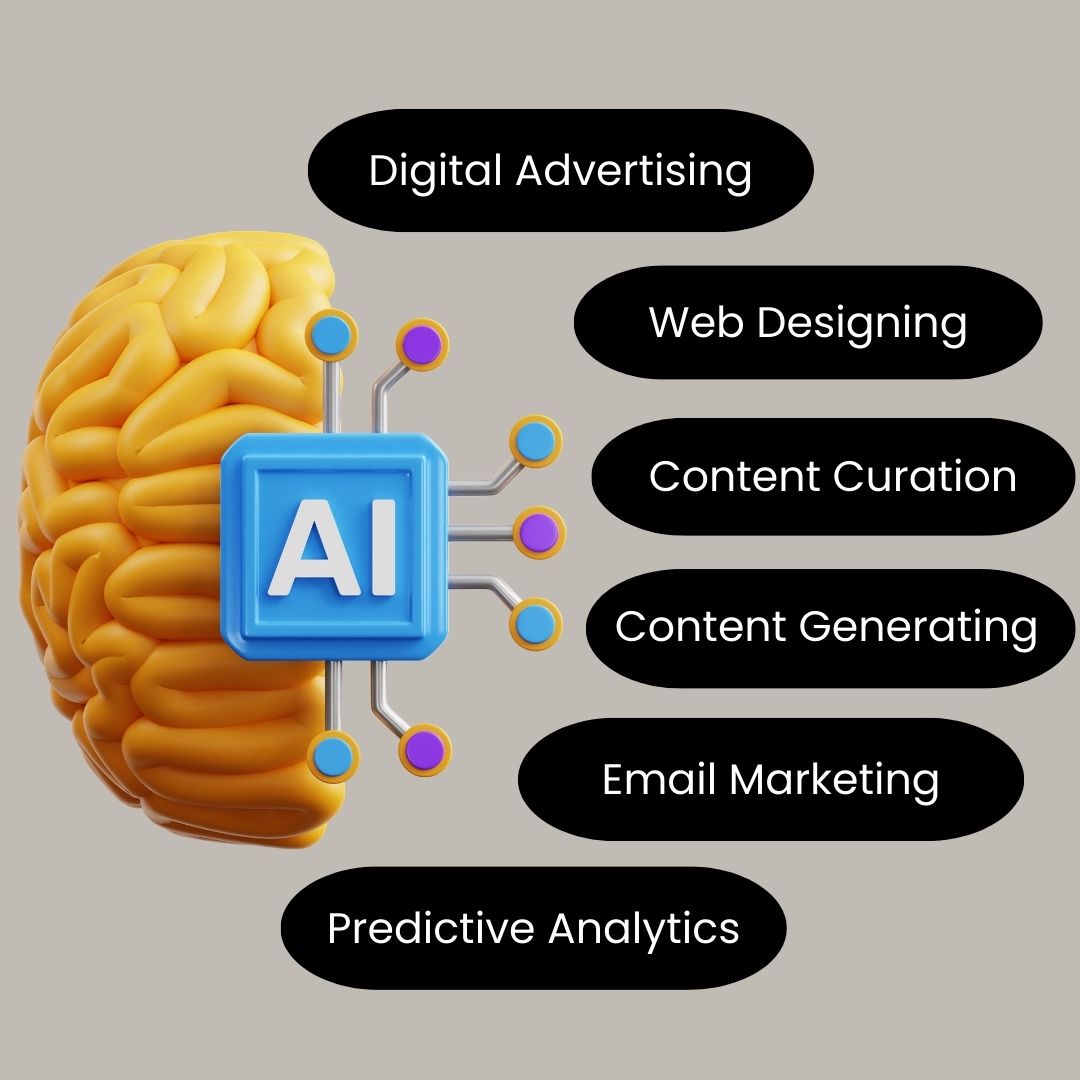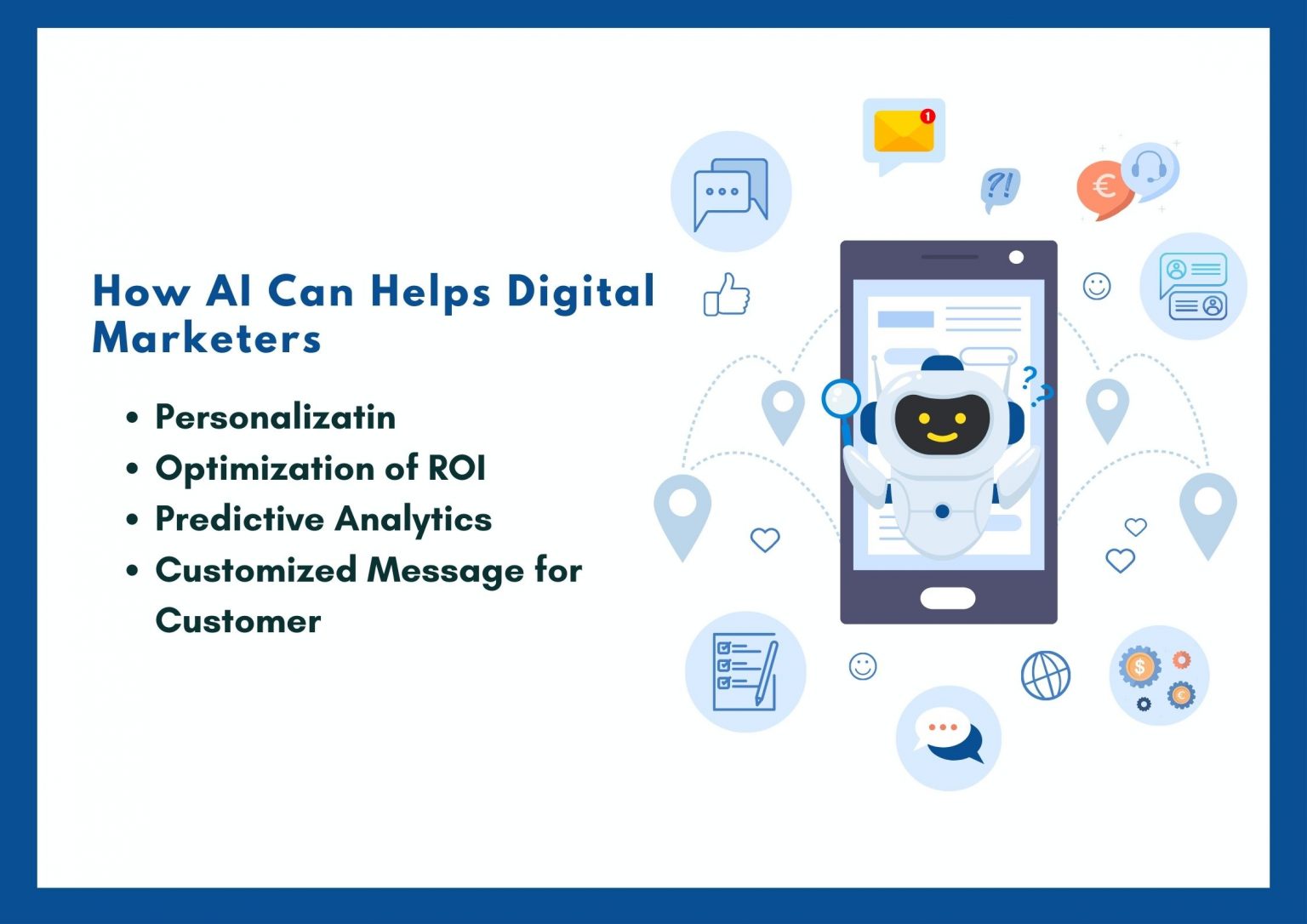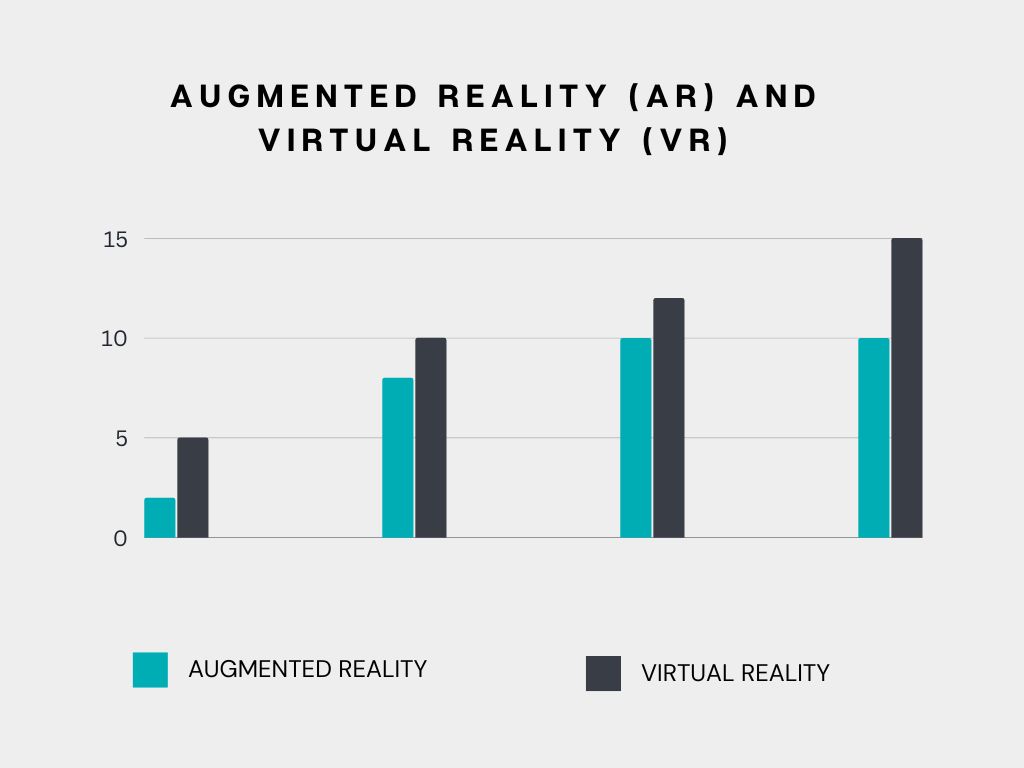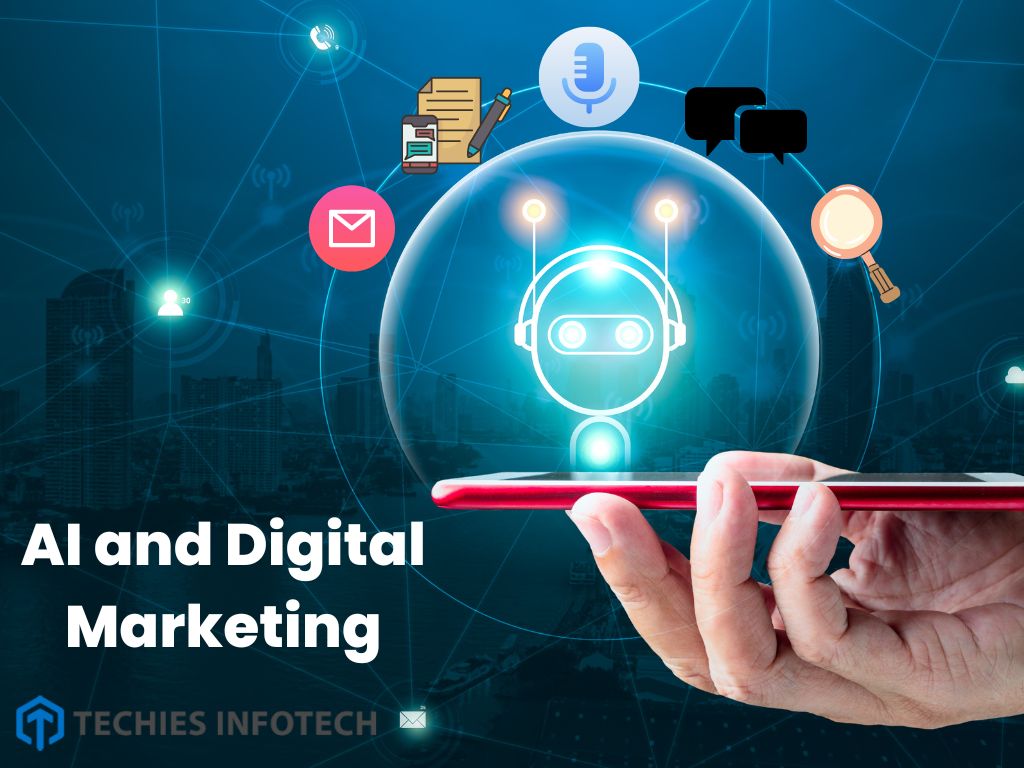A few years ago, artificially intelligent beings starred in pages of fiction novels and movies…
But 2022 was a breakthrough year for artificial intelligence, as marketers invested, adopted, and funded the technology at record levels. The world is awash with amazing tools, like DALL-E 2 and ChatGPT, and people are using AI in all sorts of ways, from creating poems to programming. Advertising and marketing will continue to be influenced by AI in 2023, and it will play an even bigger role.
With its application in diverse technologies, Artificial Intelligence is revolutionizing the digital sphere through the realm of digital marketing. Analyzing and understanding data using AI allows marketers to identify trends more accurately in the market, plan campaigns, create content, and more based on that information.
Brands and marketers are increasingly leveraging Machine Learning and Artificial Intelligence to maximize efficiency. AI can radically improve digital marketing’s core competencies, such as identifying consumer needs, matching them with products and services, and convincing them to purchase to generate sales.
McKinsey’s case study has clearly shown that marketing is one of the top areas where AI has the greatest potential to benefit businesses.
Moreover, the American Association of Marketers recently reported that AI use in marketing activities has increased by more than 27%.
Thus, AI has already been applied to a lot of marketing situations. Brands are already using different tools for content curation, SEO, and email marketing to make human marketers’ jobs easier and improve them.
As AI gains traction in marketing, more and more roles will be taken up across the function in the future. Using these platforms, digital marketers can gain a deeper, more precise, and in-depth understanding of their target market.
But before we address how you can incorporate AI technology into your digital marketing endeavors, let’s take a quick rundown of what AI marketing is.
AI Marketing: The Future of Digital Marketing

Simply put, AI marketing entails using artificial intelligence applications to make automated marketing decisions based on data collection, data analysis, and additional observations that may relate to the audience or economic trends.
In AI marketing, data and customer profiles are used to determine the best way to communicate with customers, and then tailored messages are delivered at the right time, eliminating the need for human intervention. AI marketing can provide customized content to customers based on the analysis and assessment of customer data. In this content, you may find:
- Personalized product recommendations;
- Special offers and discounts ;
- Personalized newsletters catering to customers’ interests.
As a further step, AI can automate the process of reaching out to customers or prospects based on their behaviors. Technology, platforms and analytics make this type of behavioral targeting possible.
In a time-sensitive situation, AI marketing is a great option. It is imperative not to dally and spend hours gathering and analyzing information online, especially where your competitors are almost certainly available 24/7. Only AI can help you deliver what they need and want right there and then.
The system ensures customer satisfaction by being responsive and efficient. In addition to data analysis, media buying, content generation, machine learning, and real-time personalization, AI marketing also involves natural language processing and automation.
The use of AI in generating more strategic marketing plans is crucial for businesses today.
Let’s take a brief journey through the core elements of AI and explore why marketers should utilize this technology while taking a peek at AI marketing trends in 2023 that you don’t want to miss.
Why should Digital Marketers use AI?

With AI, marketers can gain insight into their audience’s behavior and preferences, enabling them to tailor their campaigns to each individual’s needs. This can lead to higher engagement rates, customer satisfaction, and better business results.
1. Personalization: In a study by Epsilon, 80% of customers likely to do business with a company that offers a personalized experience. Through analyzing customer data and making tailored recommendations, AI can assist marketers in achieving this level of personalization at scale.For example, Netflix uses AI algorithms to recommend content to viewers based on their viewing history, resulting in higher engagement and retention rates.
2. Cost Efficiency: AI can save marketers time and money by automating repetitive tasks. AI-powered chatbots, for instance, can offer 24/7 customer service, reducing the need for human customer service representatives.Cost savings can be substantial over time. AI can optimize advertising spend and reduce waste by determining which channels and campaigns are the most effective.
3. Optimization of ROI: According to Accenture, companies that use artificial intelligence in marketing see an increased return on investment (ROI) up to 30%. Because AI helps marketers improve customer engagement, identify new growth opportunities, and optimize ad spending.
4. Predictive Analytics: Predictive analytics can also help marketers personalize marketing messages, create highly targeted campaigns, and optimize the timing of their outreach. For example, Amazon recommends products to its customers based on their shopping history and browsing habits. Customer satisfaction and sales can be increased when this level of personalization is provided.
AI allows marketers to leverage powerful data analysis capabilities to gain insight into consumer behavior and preferences, allowing them to tailor their marketing and customer service strategies to suit individual customers.
By providing personalized experiences, customers are more likely to feel valued and connected to the brand, leading to increased customer satisfaction and loyalty. This, in turn, leads to higher sales and more repeat customers.
Digital Marketing Automation Trends for 2023: Insights into AI-powered solutions

With advances in natural language processing, computer vision, and predictive analytics, marketing automation powered by AI is becoming ever more effective and capable of delivering a more personalized experience to consumers. Customer service chatbots, predictive models, and self-learning algorithms are just a few new ways AI is revolutionizing how marketers engage their audiences.
Marketers will be able to put a more accurate value on their campaigns by having access to more relevant marketing metrics. With more strategic marketing initiatives and adaptive solutions, these insights will enable business growth. 2023 is expected to witness the following trends:
1. Natural Language Processing (NLP): Machines can now interpret and understand human language through the use of Natural Language Processing (NLP), a branch of Artificial Intelligence. NLP can be used in marketing to analyze social media comments, customer service interactions, and feedback to identify problem areas, develop better services, and gain a deeper understanding of customer feedback.
2. Computer Vision: Computer vision is another subfield of artificial intelligence that involves interpreting visual information. Images and videos can be analyzed using computer vision to uncover patterns and insights to help guide marketing strategies.
3. Predictive Analytics: This entails analyzing data and forecasting future behavior with AI algorithms. As a result, marketers can adjust their strategies in response to trends. Some predictive analytics methods that can be used for marketing purposes include, but are not limited to, regression analysis, decision trees, k-nearest neighbors, and artificial neural networks.
4. Conversational Marketing: Conversational marketing uses chatbots powered by artificial intelligence to have real-time, personalized customer interactions. Marketers can use this information to improve customer experience and gain valuable insights.For instance, marketers can use conversational marketing to prompt customers with personalized offers based on their buying history and provide them with automated customer service.
5. Augmented Reality (AR) and Virtual Reality (VR): The use of AR and VR in marketing is on the rise. Marketers can increase engagement and drive sales using AI-driven algorithms to analyze customer preferences and behavior data.
6. AI Multimodal: Dynamic multimodal AI combining conversational AI and visual interfaces will replace single-modal AI. The Multitask Unified Model (MUM) by Google illustrates this trend.By utilizing the T5 text-to-text framework, Google MUM enhances the search experience by providing contextually relevant results across multiple languages.
7. Verticalized AI Solutions From Platform Providers: Cloud and platform providers are developing tailored AI solutions for specific use cases. As an example, Amazon offers vertical integration through Connect, and Google offers it through Contact Center AI.Using these technologies, marketing teams can improve customer support experiences by enabling bot-driven interactions, adaptive routing, and intelligent assistance.
8. Responsible AI: As AI becomes more widespread, there will be greater demand for its responsible use. One of the defining AI trends for 2023 will be responsible AI. As a result of issues such as facial recognition and access to confidential information, AI is still viewed with some mistrust.Increasing the personalization of services while maintaining ethical use of data is today’s challenge for marketers. Using AI responsibly in marketing means businesses only use sensitive data as needed and when it will benefit their customers.
Identifying the best tools and platforms for your particular marketing needs is the first step to implementing AI-powered digital marketing automation. Make sure to pick the one that meets your organization’s specific needs.
When selecting a platform for influencer discovery, take into account factors such as cost, user interface, and features available. Additionally, marketers need to choose a platform that reflects their campaign objectives and target audience.
Get in on AI Marketing with Techies Infotech & Stay Ahead of the Game!!
Looking for a digital marketing agency in Dubai or Mohali to enhance your customer experience and operational efficiencies??
Contact our savvy digital marketers at Techies Infotech for the marketing campaigns that drive conversions and revenue generation! With our digital marketing company in UAE, you can revolutionize the way marketing is done!!
Frequently Asked Questions (FAQs)
Q. How can AI be used in digital marketing?
Artificial intelligence is primarily used in marketing to target consumers based on their behavior. Predictions are made about what content or communications will be most useful using historical and current data about customers or prospects. By using predictive analysis, offers, and marketing campaigns can be tailored to the company’s target market based on the information gathered through AI.
Q. In what industries and businesses can AI marketing be beneficial?
AI marketing can benefit any business that competes in the digital marketplace. However, certain AI marketing tools are better suited for certain industries. Financial services and sports industries, for instance, benefit most from AI content generation.












